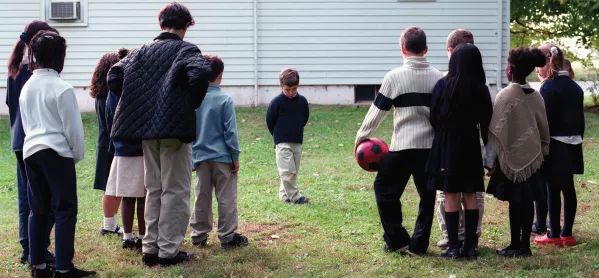A long time ago, I used to run a school choir. I loved doing it, especially when I had a colleague to help me. Directing from the piano, while you’re still playing, without sounding too much like you’re doing an impression of Les Dawson is no mean feat - and one I’ve never mastered. My favourite set of songs to sing with them were musical versions of the poems of Allan Ahlberg’s Please Mrs Butler.
They used to sing the one about the grumpy teacher with great gusto and the sort of cheeky grins and twinkling eyes that made me wonder whether they were considering hanging me on the back of the classroom door.
The one that we never managed to sing, though, was the one about picking teams. I could never quite get the hang of playing it, except very slowly and with my tongue between my teeth - and this was a disappointment.
It’s about a little boy. You know the sort I mean: one who desperately wants to be picked to go in a team - any team - and is always left until last, slowly shrivelling at the realisation of being the one nobody wants.
I vividly remember being the “One Made to Be in a Three”, or the “One Who Had to Make a Pair With a Boy”. It was awful.
Team A, Team B
So when I was the class teacher, I used to do my best to make sure this never happened. Children would shuffle up next to their friends, while I went around tapping heads and proclaiming “Team A, Team B!” until they realised I would rarely put them together, and then they would shuffle apart, imagining that I wouldn’t notice. I rarely let the children pick teams, even though they asked me.
It wasn’t just because I was concerned for those who never made it up the popularity pole. The ones who couldn’t run very fast or who couldn’t catch a ball; the ones whose parents hadn’t noticed that they’d had nits for the past month or who hadn’t given them a bath last night. Or the ones who found it hard to manage their emotions, unpopular because of their peculiarities.
It was also in the interests of fairness, of getting the best out of a game because it wasn’t being dominated by one team who were scoring all the goals, leaving their opponents little chance to practice their skills, or to celebrate much success. I was giving everyone a fair chance, together, because that is what gets everyone’s standards up in a teaching situation.
Which brings us to grammar schools. I wish that education ministers who are seeking to make our system one that works for all children would come and talk to primary school teachers.
Because children with SEND don’t just go to special schools. The vast majority are in the mainstream, and, if we go down the route of selection, they stand in danger of being those children - the ones nobody wants.
Nancy Gedge is a consultant teacher for the Driver Youth Trust, which works with schools and teachers on SEND. She is the TES SEND specialist, and author of Inclusion for Primary School Teachers




